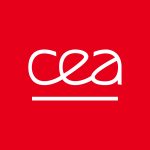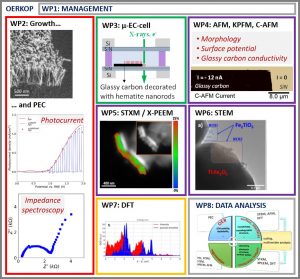Oxygen evolution reaction: the key to optimize photocatalytic water oxidation (01/04/2023 – 31/03/2027)
The ANR OERKOP project aims to understand and describe the mechanisms underlying the OER for co-catalyst modified hematite photoanodes, by using a correlative operando characterization approach at the nanoscale. OERKOP proposes a comparative study between two archetypal materials used as photoanodes: α-Fe2O3 and BiVO4, both catalytically activated by oxyhydroxide catalysts (M-OOH, with M = Fe, Ni, Co, Cu, Zn). Surface kinetics and time stability during the oxidation will be systematically evaluated. We intend combining multi-scale and multi-selective techniques – scanning transmission X-ray microscopy (STXM) and scanning transmission electron microscopy (STEM). Both techniques will employ a common sample environment in a dedicated photoelectrochemical cell. Complementary DFT calculations will allow dissecting complex effects and determining the reaction priorities of different photocatalytic sites.

Consortium
SPEC, CEA – CNRS
Univ. Paris-Saclay
Synchrotron SOLEIL
IPCMS – Strasbourg
Stefan STANESCU (HERMES)
Jean-Baptiste BOY (HERMES)
Karine CHAOUCHI (Laboratoire de chimie)
Stephanie BLANCHANDIN (Laboratoire de chimie)

ANR funding of the OERKOP project
Positions:
NEW: M2 intern 01/03/2026 to 31/08/2026
Title: Multidimensional changes at the photoanode/electrolyte interface during solar water splitting
Supervisor (main): STANESCU Stefan
Keywords: solar water splitting, hematite photoanode, spectromicroscopy, operando
Description:
Mechanisms underlying the oxygen evolution reaction (OER) at the photoanode / electrolyte interface are still in doubt, locking the necessary knowledge leap for efficient water splitting. Advanced operando spectromicroscopy approaches (STXM, ptychography) offer a key to clarify the role of each pertinent parameter (morphology, structure, chemical coordination, etc.) at nanoscale. This internship is part of a project that aims at exploiting the operando methods implemented lately at the STXM instrument (HERMES beamilne, SOLEIL synchrotron), within the OERKOP ANR grant. Homemade micro-photoelectrochemical cells fitting the commercial Protochips cell holder will be used allowing photoanode materials to be grown directly on the glassy Carbon working electrode by well-established chemical deposition methods developed in our group1-3. The operando spectromicroscopy methods will be complemented by the development of a time-resolved scheme in the millisecond/second range to track transitory reversible effects during the OER.
The intern will work in close relationship with a post-doctoral fellow and a PhD student, participating actively in running STXM operando electrochemical experiments. In addition, he/she will develop various skills covering sample synthesis using well-established chemical approaches (aqueous chemical growth, hydrothermal mineralization, dip coating), material characterization (X-rays diffraction, Raman spectroscopy, UV-vis absorption), photoelectrochemical characterization (linear sweep, cyclic voltammetry) and spectromicroscopy using the STXM instrument at the HERMES beamline. He/she will access state of the art instrument and methods (operando, ptychography) developed recently.
[1] S. Stanescu et al., ACS Applied Materials & Interfaces., 15, 26593 (2023); https://doi.org/10.1021/acsami.3c02131
[2] S. Stanescu et al., J. Electron Spectrosc. Relat. Phenom., 265, 147334 (2023); https://doi.org/10.1016/j.elspec.2023.147334
[3] D. Stanescu et al., Journal of Materials Chemistry A., 8, 20513 (2020); https://doi.org/10.1039/d0ta06524b
Additional information: The main internship activity will take place at SOLEIL facility, with part of electrochemistry measurements and synthesis of samples that will be carried out at the CEA laboratory just nearby.
PhD opportunity: not financed
_____________________________________________________________________________________________________
PhD : Meyssa MOCKBEL started her PhD thesis in September 2024 at SOLEIL / IPCMS
Preliminary works and results:
- Scanning transmission X-ray spectromicroscopy: a nanotool to probe hematite nanorods for solar water splitting, Stefan Stanescu, Dana Stanescu, Adam Hitchcock
- preprint March 2023 https://chemrxiv.org/engage/chemrxiv/articledetails/640de8d7b5d5dbe9e825c049;
- Journal of Electron Spectroscopy and Related Phenomena 265 (2023) 147334, https://doi.org/10.1016/j.elspec.2023.147334
- Enhancement of the Solar Water Splitting Efficiency Mediated by Surface Segregation in Ti-doped Hematite Nanorods, Stanescu S, Alun T, Dappe YJ, Ihiawakrim D, Ersen O, Stanescu D.
- preprint February 2023 https://chemrxiv.org/engage/chemrxiv/article-details/643c03bc73c6563f14fae441
- ACS Appl. Mater. Interfaces 2023, https://doi.org/10.1021/acsami.3c02131
- Characterizing surface states in hematite nanorod photoanodes, both beneficial and detrimental to solar water splitting efficiency, Dana Stanescu, Mekan Piriyev, Victoria Villard, Cristian Mocuta, Adrien Besson, Dris Ihiawakrim, Ovidiu Ersen, Jocelyne Leroy, Sorin G. Chiuzbaian, Adam P. Hitchcock, Stefan Stanescu, J. Mater. Chem. A, 2020, 8, 20513-20530, https://doi.org/10.1039/D0TA06524B; hal-02934466
Results dissemination during OERKOP
Highlights:
2023 : Des matériaux simples et abondants pour une énergie future propre et efficace :
Voir les pages :
Oral and poster presentations
- Efficient Strategies To Optimize Photoelectrochemical Activity of Hematite-based Photoanodes (poster)
Bilal Meddas , Léon Schmidt, Jean Baptiste Boy, Karine Chaouchi, Stéphanie Blanchandin, Walid Baaziz, Yannick Dappe, Ovidiu Ersen, Ştefan Stănescu, and Dana Stănescu.
ECATALYTIX, X-rays and electronic operando techniques for electrocatalysis – April 3-5, 2024, Strasbourg (France) - Enhancement of the Solar Water Splitting Efficiency Mediated by Surface Segregation in Ti-doped Hematite Nanorods (oral)
Ştefan Stănescu, Leon Schmidt , Yannick J. Dappe, Dris Ihiawakrim, W. Baaziz, Ovidiu Ersen, Dana Stănescu,
8th International Conference on Catalysis and Chemical Engineering – February 29, 2024 | Boston, MA (USA) - Band engineering of Earth abundant materials for efficient solar water splitting (oral)
Ştefan Stănescu, Yannick J. Dappe, Stéphanie Blanchandin, Karine Chaouchi, Dris Ihiawakrim, Ovidiu Ersen, Dana Stănescu,
18th SUM2024, 18 & 19 janvier 2024, SOLEIL Synchrotron (France) - Correlative in situ microscopy study of photoanodes used in solar water splitting applications (oral)
Léon Schmidt, Walid Baaziz, Dana Stănescu, Ştefan Stănescu, Ovidiu Ersen,
The 20th International Microscopy Congress (IMC20), September 10-15, 2023, Busan (Korea) - Correlative in situ microscopy study of photoanodes for solar water splitting (oral)
Léon Schmidt, Walid Baaziz, Dana Stănescu, Ştefan Stănescu, Ovidiu Ersen,
18ème Colloque de la Société Française des Microscopies, 3 au 7 juillet 2023, Rouen (France)


